Archive for June, 2009
After a whirlwind 4 days in Taipei with my parents involving a lot of eating, packing up our stuff and feeling sad, and getting our faces lasered (seriously—me, Momma, and Poppa Meng all had moles removed), the Mengs & Menghermanns boarded a plane for Shanghai! My parents graciously helped organize a tour with Frank, the owner of China Stix, who you may know as The Guy Who Catered Our Wedding. Frank takes tour groups over to China on EATING tours, which is not really that different than joining a normal tour group, except that you gorge yourself on local, gourmet foods at every meal. The Meng(hermann)s will be touring Shanghai and Huangshan on our own before meeting up with the rest of the tour group in Hangzhou.
Our first indication that the family would be traveling together in a different style than Jeremy and I are used to happened as soon as we stepped off the plane. There was someone there to pick us up. I repeat: someone came to pick us up. No wandering around asking where the bus is, no fending off touts trying to sell us overpriced private car rides, no lugging our bags to the curbside to hail a taxi. Now this is the life. ![]()
The second indication that this tour was a whole new ball game happened when we got to the hotel. Our tour guide mentioned that it was a Ramada, so I didn’t think much of it, but when we got there…WOW! As Jeremy said later, “Five stars are definitely better than one.” Apparently, American hotel chains are the cream of the crop in China, even chains that you wouldn’t normally associate with “5 stars” (like Howard Johnson, aka “The HoJo”).
We were in Shanghai for only 24 hours this first time around—Jeremy and I will be returning for a longer stay since we fly out to Japan from Shanghai. J and I like to travel at a moderate pace, and I thought that we weren’t going to see much in 24 hours. But again, this is not your typical Hope and Jeremy tour. We had a tour guide and a driver that whisked us from sight to sight, and darn if we didn’t visit all of the major Shanghai tourist locations (albeit for a short amount of time).
For our first night in town, we went to a Chinese acrobatic show called ERA. Imagine Cirque du Soleil, only more bendy. The feats of flexibility and balance were incredible! Unfortunately, we couldn’t take photos at the show, but suffice to say we were sufficiently astounded by the guy who used his feet to throw bowls onto his head while balancing on a board that was rolling on top of a soup can (yeah, it sounds weird, and it kinda was), the women who could place their butts on top of their heads, and the somersaulting acrobats who could leap 15 feet in the air and backflip through tiny rings. If you’re ever in Shanghai, it’s definitely worth a visit.
The next day, we got up bright and early to hit the town. First stop: our tour guide took us to Nanjing East Road, which is basically a huge shopping street. Jeremy and I didn’t find this very interesting, but I think it does offer a glimpse into the new China. People here like to get their shop on, and they like to do it with big name Western brands. Strangely, luxury brands are more expensive in China than they are in the States, even though everything is made here. Chinese people buy up a storm when they visit the US because everything is so relatively cheap.
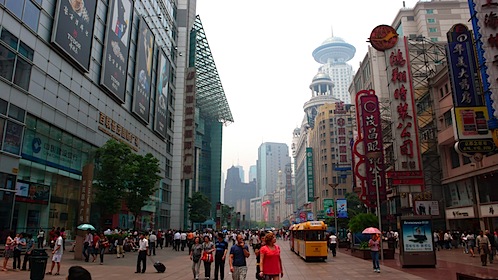
Shanghai’s famous shopping street, Nanjing East Road.
Our next two stops were at “museums” that double as “gift shops.” It seems like the government encourages tour guides to take you to these locations, and the people who run these “gift museums” can be terribly good at the hard sell. We saw some amazing Chinese embroidery, and some Chinese jade carvings. Below is a pixiu, a mythical animal that does not have an anus, so it can take in all the good fortune but never poop it out (I can’t make this stuff up). You are supposed to rub it’s nostrils for good luck, which my Dad is doing here:
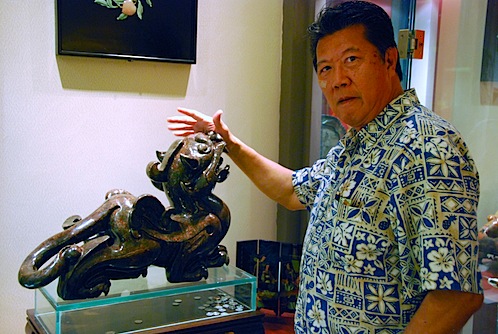
Next, we made our way over to Yuyuan Gardens, a large garden complex that offers a more historical glimpse into Shanghai than Nanjing East Road. Yuyuan is basically a large garden complex packed to the gills with Chinese architecture, koi ponds, famous Chinese rock formations (more on this below), and tourists.
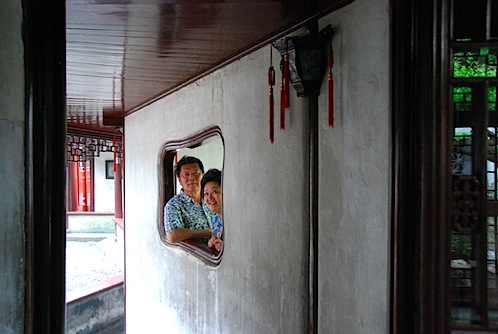
My parents looking cute in Yuyuan Gardens.
Chinese people take their rocks seriously. We learned that in order to be considered “beautiful” to Chinese people, a rock needs to be have four features: shou (it has to be skinny), tou (it has to be transparent), lou (it has to have a bunch of holes), and zhou (it has to be all wrinkled). And it all rhymes! There is one rock in particular in Yuyuan Gardens that everybody freaks out over; shown in this photo:
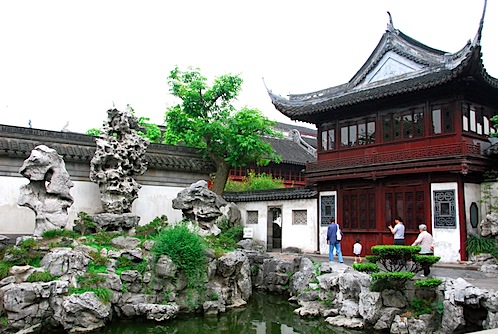
The tallest rock in the photo (second from the left) is know for it’s shou, tou, lou, and zhou qualities.
Yuyuan Gardens also has a huge shopping area with food stalls. We tried Shanghai’s famous xiao long tang bao (soup XLB), which is so big you can drink the soup out of the bun with a straw!
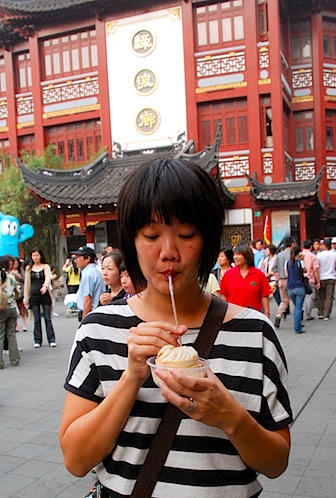
Me trying the famous xiao long tang bao.
We ended our stay in Shanghai with a quick visit to the Bund, a waterfront boardwalk where you can enjoy Shanghai’s famous skyline.
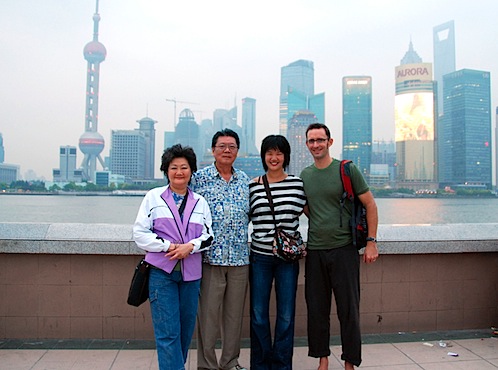
Mengs and Menghermanns Bund’ing it up.
Our stay in Shanghai was brief, but we sure did (and learned) a lot. We’ll see you again soon, Shanghai!
Now, before we get into all the incredible things we’ve seen in China (and we’ve got a LOT to show you), I thought a little intro to the country was in order. If any country deserves a post dedicated entirely to it’s (mis)conceptions, it’s China. I have to admit, we were a little worried about coming here…life is just so good in Taiwan—everyone is helpful and friendly, everything is clean and safe, every place is beautiful/interesting/vibrant. From the stories we heard (and from my previous experience in Beijing in 2000), we were worried that China was going to be dirty/polluted, that the people were going to be rude, and that traveling around the country was going to be just plain difficult.
Of course, the Taiwanese don’t help matters when it comes to disseminating negative opinions about the mainland. For those who are unaware of the story, Taiwan is a democratic nation that considers itself an independent entity; China believes that Taiwan is a part of China. The relationship can be quite contentious; most famously, Jinmen, a Taiwanese island 2km off the coast of Chinese Xiamen, was bombed regularly throughout the 1950s and 60s by the Chinese, but only on every odd-numbered day (the legacy of a weird wartime agreement that China had with Taiwan). As you can imagine, the future of the relationship between the two nations is vehemently debated by their populaces.
Anyway, to say that some Taiwanese think of their big neighbors to the north as heathens would not be too far from the truth. Jeremy and I heard countless stories from Taiwanese people when they found out we were headed off to China. The bathrooms are disgusting!, they said. They fertilize their fields with human poo! The locals will follow you into your bathroom stall to watch you pee (because they are so fascinated with your foreign-ness), so bring an umbrella to shield yourself from their prying eyes! And worst of all, everyone will be mean or try to cheat you.
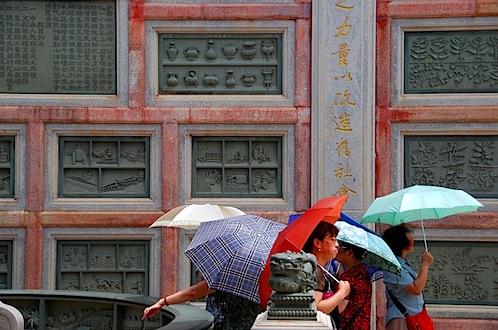
The umbrella brigade, Xiamen.
On top of all these opinions were my own impressions from my first and only visit to the mainland. I went to Beijing in 2000 as a guest of the government. This was when Beijing had just won the 2008 Olympics, and China was trying to promote the country as an international tourist destination. I came here as a bellydancer with my troupe to participate in the International Cultural Tourism Festival, along with 2000 other dancers and musicians from 60 different countries. So, I had a pretty different experience of the place than most visitors back then, but I did (1) use the most disgusting public bathroom I have ever seen (basically a large dirt room with holes dug out of the ground…no doors, of course), and (2) feel the heavy hand of the government. Since we were basically invited there to experience the “new” China and then go home and tell all our friends how awesome it was, we were escorted around all the most famous palaces and gardens in Beijing, and taken to a “farming village,” where all the residents had been given new but poorly built condos (to show how “modern” China had become). Of course, this experience did not do much to improve China’s reputation amongst the San Franciscans I was traveling with; many of them went home with a bad taste in their mouths.
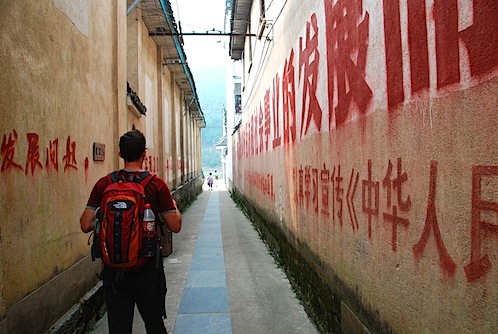
Jeremy and Communist propoganda, Anhui province.
But I stayed on an extra week after everyone else left, and was shown around town by a friend of a friend who lived in Beijing. He was a travel food writer, and was well-connected with the art scene. What I saw during that week left me so impressed with China that I dreamed for a while of moving to Beijing.
Given all that we heard in Taiwan and all that I witnessed in 2000, our expectations kept wavering back and forth between intrigue and trepidation. I imagined that returning to China after 9 years—after the country’s moment of glory during the 2008 Olympics, after the rapid industrialization that has taken place here—that much would be changed. I was not wrong. I mean, I knew it would be different, but in just 10 years, China has become a completely different country: not just the way it looks, but the attitudes of the people. They seem more hopeful somehow, more relaxed, and on the other hand, more imperious, too. I mean, just imagine for a minute that every building in San Francisco was constructed in the last 15 years. Imagine what that kind of rapid change does to a citizen, the amount of national pride they must feel, and how quickly that can turn into conceit. In fact, Frank (the guy who catered our wedding—he was our tour guide for the 2 weeks we traveled with my parents here), who brings American tour groups to China almost every month, let us in on his feelings towards the country: “The structure is all there…the hotels, restaurants, everything is first class. But the people…some of them got too rich too fast. There is a lot of arrogance here.”
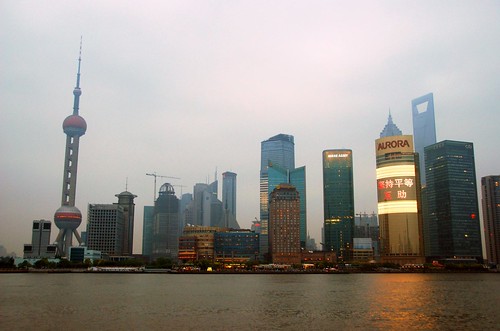
The Bund, Shanghai. The haziness you see in the background is “moisture” in the air, not “pollution.”
Indeed, China does sometimes seem like an awkward teenager whose maturity has not yet caught up with its anatomy. For instance, even in the 5-star hotels and restaurants, the service here can leave a lot to be desired. We had an awkward experience with a bellboy who lingered in our room, waiting to be tipped (even though we later found out that my parents had already tipped him on our behalf). And, most dramatically, the hotel we booked in Xiamen tried to send us to the old wing, until Frank put his foot down and demanded that we be given rooms that we had booked in the newer part of the hotel. Later on, I heard through the tour group grapevine how Frank explained that sometimes the hotels (even the 5-star hotel in Xiamen) will try to pull stuff like this, since most people will just accept it.
Then again, there does seem to be some real effort towards change (or at least the illusion of change). I wouldn’t be surprised if I found out that China had hired some Western consulting company to come in and educate the government about China’s reputation in Europe and America, and then had gone about swiftly changing all these habits/features. Disgusting bathrooms? Well, they’re still here, but they are not nearly as bad as the dirt-ditch-in-the-ground I visited in Beijing in 2000, and they certainly are not in the bigger cities anymore. Our tour guides seem particularly sensitive to the issue (clearly they have been instructed to be on high alert re: this topic), one going so far as to tell us that we should not drink water that day, since we were going into the countryside and he couldn’t guarantee the cleanliness of the bathroom. Air pollution? Well, now that smog in the air has been rebranded as “moisture” (seriously—our tour guide in Shanghai told us that we were not looking at air pollution, but rather, the sky was hazy because it was “very wet, very moisture.” Yeah, right). And of course, Beijing famously went around trying to correct all it’s “Chinglish” signs (one of the things I find most charming about China). We even heard that the Beijing populace was instructed not to wear more than 3 colors at a time (Chinese people tend to wear whatever they happen to pull out of their closets, clashing patterns be damned).
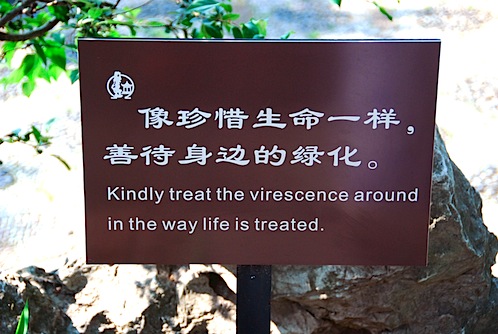
Amazing “Chinglish” in Suzhou, China.
Despite how quickly things change here, the government has not yet managed to stamp out all things distasteful to foreigners. People think nothing of picking their noses in public. Or of hacking up a huge loogey and spitting in right next to your foot. Bumping into you or cutting in line is not even considered rude—Chinese barely even blink an eye when this happens to them. The little kids with giant slits cut into their pants (so they can squat in the street and do their business) are still around, though there are fewer of them.
And the people still idolize Western culture. I can’t tell you how many strangers have come up and asked Jeremy to take a photo with them. Our tour guides keep telling me how “if Jeremy lived here, all the girls here would be calling him” (um, thanks?).
I write about these things not because I find them distasteful, but because China is (as is well documented) in the midst of serious economic and social change. The China that Jeremy and I are experiencing right now may not ever exist again, as the country rapidly reinvents itself (at least on the surface) into a first-world nation. I find this incredibly fascinating. I think it probably turns some people off to see the power of the State, but for me, traveling in China during this time is an awe-inspiring experience.
With all this rapid economic and social turnover, it’s easy to think that China has turned a corner politically as well. But, in fact, there is evidence that the country is still ruled with a heavy hand. There is still a one-child policy (but only in the cities…if you live in the country and your firstborn is a girl, you are allowed to try for another one after 5 years; if you live in the city and you go for a second, you will be fined 100,000RMB—about US$15,000—and your second child’s education will not be paid for by the state). People have had their villages turned into tourist traps with absolutely no compensation from the government (we visited a water village where they charged an entry fee, though the residents were not compensated, and were not even allowed to vend until 4PM). When there was some confusion over one of our flights and we ended up at the wrong airport, the tour bus driver anxiously sped us over to the correct airport, because if we missed our flight, he would be fined.
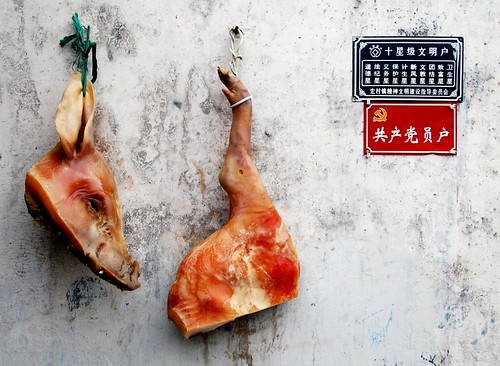
Dry-cured pig parts and a plaque that reads “a Communist lives here.” Hongcun, China.
Still, this is a far cry from the China’s authoritarian past. Many of our tour guides, when showing us around ancient villages, mentioned that much of the town and its ancient relics had been destroyed during the Cultural Revolution. I found this critique of the government interesting, until I realized that the current government was probably trying to distance itself from the destruction and oppression of the Mao era.
All of this is bittersweet to overseas Chinese like my parents. There is real pride from seeing China deliver itself intact from the isolation and poverty of the Mao era, but underneath the surface, some anger and shame lingers over what happened to The Individual during Communist rule. My mother, who was born in Taiwan only one year after her mother (my Popo) had fled China with her KMT Air Force husband, told me that she truly never thought she would be able to come to this country in her lifetime. It was amazing to be here with her and my Dad and to hear the heartbreaking stories of how first the Japanese invasion and then the Communist Revolution broke up my grandparents’ families (all four of my grandparents left home when they were between 14 and 18; only my Nai-Nai, paternal grandmother, ever reunited with her mother—50 years after she left home).
I’m not really sure if there is a clean end to this post, I suppose there really can’t be since our education of China is ongoing. I’m not even really sure if there was a point to this essay, other than to put all my thoughts down in pixels before they get lost in a flurry of activity (and perhaps, buried with a China that will not exist in 10 years). Perhaps I just wanted to document this time so that when we return to the country sometime in the future, we can look back and say, “remember when?” Suffice to say, I am fascinated with every minute of our experience here, and I feel, as descendant of this country’s history, somehow more connected to this place that I did to Australia or Laos, for example. I observe this country with a keener eye and a deeper understanding of its story. And I am learning that I love China as you would love a family member: sometimes they frustrate you, sometimes they challenge you, and sometimes you don’t agree with their actions, but in the end, you still share blood, and that is the tie that will forever bind.
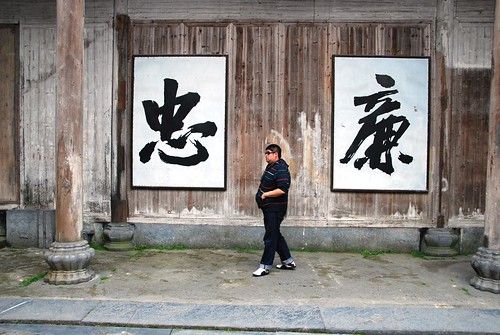
Eddo and “loyalty” (on the left). I don’t know what the word on the right says…Mom? Dad? Help?
